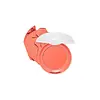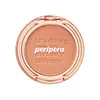What's inside
What's inside
 Key Ingredients
Key Ingredients

 Benefits
Benefits

 Concerns
Concerns

 Ingredients Side-by-side
Ingredients Side-by-side

Talc
AbrasiveMica
Cosmetic ColorantCI 73360
Cosmetic ColorantHydrogenated Poly(C6-14 Olefin)
EmollientDiisostearyl Malate
EmollientSilica
AbrasiveCI 77891
Cosmetic ColorantPolyethylene
AbrasiveCI 19140
Cosmetic ColorantCI 77491
Cosmetic ColorantPhenyl Trimethicone
Skin ConditioningTriethoxycaprylylsilane
Ethylhexylglycerin
Skin ConditioningPhenoxyethanol
PreservativeGlyceryl Caprylate
EmollientHydrogen Dimethicone
Cetearyl Alcohol
EmollientHdi/Trimethylol Hexyllactone Crosspolymer
Neopentyl Glycol Diethylhexanoate
EmollientPolyglyceryl-2 Triisostearate
EmulsifyingTriethylhexanoin
MaskingPolyhydroxystearic Acid
EmulsifyingTalc, Mica, CI 73360, Hydrogenated Poly(C6-14 Olefin), Diisostearyl Malate, Silica, CI 77891, Polyethylene, CI 19140, CI 77491, Phenyl Trimethicone, Triethoxycaprylylsilane, Ethylhexylglycerin, Phenoxyethanol, Glyceryl Caprylate, Hydrogen Dimethicone, Cetearyl Alcohol, Hdi/Trimethylol Hexyllactone Crosspolymer, Neopentyl Glycol Diethylhexanoate, Polyglyceryl-2 Triisostearate, Triethylhexanoin, Polyhydroxystearic Acid
Talc
AbrasiveMica
Cosmetic ColorantMethyl Methacrylate Crosspolymer
Diisostearyl Malate
EmollientOctyldodecyl Stearoyl Stearate
EmollientVegetable Oil
Skin ConditioningDimethicone
EmollientMagnesium Myristate
Isocetyl Myristate
EmollientHydrogenated Lecithin
EmulsifyingAluminum Hydroxide
EmollientTitanium Dioxide
Cosmetic Colorant1,2-Hexanediol
Skin ConditioningGlyceryl Caprylate
EmollientMethicone
EmollientHelichrysum Italicum Flower Water
Skin ConditioningCI 19140
Cosmetic ColorantCI 77742
Cosmetic ColorantCI 73360
Cosmetic ColorantCI 77499
Cosmetic ColorantCI 77007
Cosmetic ColorantTalc, Mica, Methyl Methacrylate Crosspolymer, Diisostearyl Malate, Octyldodecyl Stearoyl Stearate, Vegetable Oil, Dimethicone, Magnesium Myristate, Isocetyl Myristate, Hydrogenated Lecithin, Aluminum Hydroxide, Titanium Dioxide, 1,2-Hexanediol, Glyceryl Caprylate, Methicone, Helichrysum Italicum Flower Water, CI 19140, CI 77742, CI 73360, CI 77499, CI 77007
 Reviews
Reviews

Ingredients Explained
These ingredients are found in both products.
Ingredients higher up in an ingredient list are typically present in a larger amount.
CI 19140 is also known as Tartrazine. Tartrazine is a synthetic dye used in cosmetics, foods, and medicine to add a yellow color.
Tartrazine is created from petroleum and is water-soluble.
Some people may experience allergies from this dye, especially asthmatics and those with an aspirin intolerance.
Learn more about CI 19140Ci 73360 is a synthetic red-pink dye.
Diisostearyl Malate is an emollient and most often used in lip products. It comes from isostearyl alcohol, a fatty acid, and malic acid, an AHA.
As an emollient, Diisostearyl Malate helps create a thin film on your skin to trap moisture in. This helps keep your skin soft and smooth.
Glyceryl Caprylate comes from glycerin and caprylic acid, a fatty acid from coconut. It has emollient and emulsifier properties.
As an emollient, it helps hydrate your skin. Emollients work by creating a barrier on your skin to trap moisture in, helping to keep your skin soft and smooth.
On the other hand, emulsifiers prevent ingredients (such as oil and water) from separating.
Learn more about Glyceryl CaprylateMica is a naturally occurring mineral used to add shimmer and color in cosmetics. It can also help improve the texture of a product or give it an opaque, white/silver color.
Serecite is the name for very fine but ragged grains of mica.
This ingredient is often coated with metal oxides like titanium dioxide. Trace amounts of heavy metals may be found in mica, but these metals are not harmful in our personal products.
Mica has been used since prehistoric times throughout the world. Ancient Egyptian, Indian, Greek, Roman, Aztec, and Chinese civilizations have used mica.
Learn more about MicaTalc is a clay mineral. It helps absorb moisture and improve the texture of products. Like other types of clay, Talc can have a slight exfoliating effect on skin. Talc can be added to increase the volume of products.
Some Baby powders are made by combining talc with corn starch. The word "talc" comes from Latin and originates from Arabic. Talc is a mineral commonly found throughout the world.
If you have any concerns about using talc, we recommend checking out the FDA's official page.
Learn more about Talc